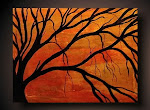The Tradition of the Shaman
Publicada por
Arith Härger
/ 7:14 PM /
When communities were much more isolated and self-reliant than modern society is, shamans played and integral part in their cultures, performing numerous and specific dduties. They practised healing in cases of sickness and injury, but they were not specifically healers. Although they cummuned with ancestors, spirits and gods, they were not exclusively priests, and while they offered wise counsel to their communities, they were not solely sages. Rather, they fulfilled a combination of these roles and others besides.
The Shaman Role
To understand the function of a shaman, it is necessary to adopt a world view relative to traditional peoples. Typically, older cultures more in touch with the natural world have been animistic societies. Animism is a term derived from the latin anima, which means soul, and these older cultures held the belief that all things possessed a soul or spirit. The fundamental role of the shaman was to atct as an intermediary in relating to the other spirits of the earth: the animals, the land, the rain, the crops and so on. Because humans were so dependent on the forces of nature and the other beings of the planet, communicating with them was seen as a way of predicting problems of finding a way out of them. The shaman could send his or her soul out on a journey to meet with these other spirits and ensure a successful hunt or determine why a crop was failing, or if there would be a drought. These journeys of the soul could also lead shamans to other dimensions where they would commune with gods, find special knowledge or aquire powers which gave them an advantage when living in difficult times or healing the sick.
It was this ability to travel at will to other realms that marked out the shaman. Very often it was unlooked for, with visions occurring spontaneously, or caused by traumatic experiences such as severe illness or injury. What is iften termed "madness" in modern western society was seen as being "touched by the gods" by traditional people. Shamans usually lived somewhat apart from the rest of the community, because their powers made them diferent from other people. However, individuals who were able to hear voices and experience realities beyond the normal scope of perception were regarded with respect and awe.
em 7:14 PM | Keywords: About Shamanism, animism, Ceridwen Merlin, Legendary Shamans, Modern Shamanism, Odin, shaman, Shaman's Role, Shamanic Journeying, shamanism, Traditions




0 comentários:
Post a Comment